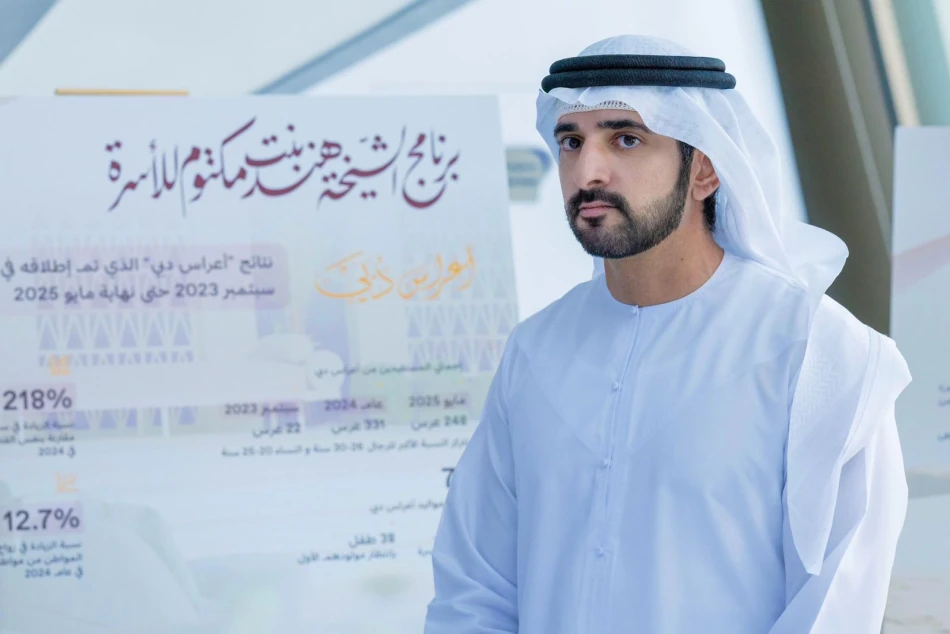
Dubai's Crown Prince Emphasizes Investing in Families for a Brighter National Future
Dubai's Family Program Achieves 95% Satisfaction Rate as Marriage Initiative Surges 218%
Dubai's ambitious family welfare program has delivered remarkable results in its first year, with beneficiary satisfaction reaching 95% and wedding registrations through the "Dubai Weddings" initiative jumping 218% compared to the previous period. The program now accounts for over 27% of all marriages registered in Dubai, signaling a significant shift in how the emirate supports its citizens' social needs.
Strategic Social Investment Pays Dividends
Sheikh Hamdan bin Mohammed bin Rashid Al Maktoum, Crown Prince of Dubai and Chairman of Dubai's Executive Council, announced the program's success metrics via his official social media channels. The Sheikha Hind bint Maktoum Family Program, launched in January 2024, has exceeded expectations across multiple social welfare indicators.
The Crown Prince emphasized that these results reflect a comprehensive vision and clear methodology, stating that "investing in the family is investing in the future of the nation." This approach aligns with Dubai's broader strategy of positioning social welfare as a cornerstone of economic development.
Marriage Initiative Transforms Social Landscape
Dramatic Uptick in Participation
The Dubai Weddings initiative has emerged as the program's flagship success story. The 218% increase in participation demonstrates how targeted government support can influence social behavior and reduce barriers to marriage—a critical concern across the Gulf region where rising costs have delayed family formation.
With more than one in four Dubai marriages now facilitated through this program, the initiative has effectively become a primary pathway for couples entering matrimony in the emirate. This level of market penetration suggests the program addresses genuine financial and logistical obstacles that previously deterred couples.
Regional Context and Implications
Dubai's approach mirrors similar family support initiatives across the Gulf, but with notably higher engagement rates. Saudi Arabia's marriage support programs and Qatar's family welfare schemes have achieved more modest participation levels, making Dubai's 27% market share particularly significant.
The program's success could influence policy decisions across the UAE's other emirates and potentially serve as a model for neighboring countries grappling with declining marriage rates and rising social costs.
Economic and Social Strategy Integration
The program operates within Dubai's "Social Agenda 33," a long-term framework that treats social welfare as economic infrastructure. This approach recognizes that family stability directly impacts workforce productivity, consumer spending, and demographic sustainability—all critical factors for Dubai's post-oil economic diversification.
For investors and businesses, these metrics suggest a more stable social foundation that could support sustained consumer demand and workforce development. The high satisfaction rates indicate effective program design that could be replicated in other social services sectors.
Measuring Success Beyond Numbers
The 95% satisfaction rate represents more than administrative efficiency—it reflects a program structure that genuinely addresses citizens' needs rather than imposing bureaucratic solutions. This level of user satisfaction typically indicates streamlined processes, relevant benefits, and responsive program management.
The program's success positions Dubai as a leader in evidence-based social policy within the region, demonstrating how targeted government intervention can achieve measurable social outcomes while maintaining high citizen satisfaction. This model could prove influential as other Gulf states reassess their own family support strategies in an era of economic diversification and social change.
Most Viewed News

 Sara Khaled
Sara Khaled






